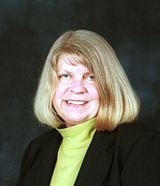

 | | 
|
|---|
 Dr. Kristin Bowman-James is currently the Professor of Chemistry at the University of Kansas in Lawrence, Kansas and is Project Director of Kansas NSF Experimental Program to Stimulate Competitive Research (EPSCoR). Kristin has been at the University of Kansas for 31 years and is currently teaching, doing chemical research, directing her post-docs and graduate students, and administrating the Kansas EPSCoR. Kristin also serves on a number of administrative panels and encourages women faculty members.
Dr. Kristin Bowman-James is currently the Professor of Chemistry at the University of Kansas in Lawrence, Kansas and is Project Director of Kansas NSF Experimental Program to Stimulate Competitive Research (EPSCoR). Kristin has been at the University of Kansas for 31 years and is currently teaching, doing chemical research, directing her post-docs and graduate students, and administrating the Kansas EPSCoR. Kristin also serves on a number of administrative panels and encourages women faculty members.
At the University of Kansas, Kristin has held many positions. She started teaching chemistry and doing chemical research. She later became Head of the Chemistry Department and found many more interesting things to do.
This Philadelphia native received her undergraduate and Ph.D. degrees from Temple University. She followed this with a postdoctoral appointment with Dr. Daryle H. Busch at Ohio State University. Kristin says she entered the field of chemistry because she liked and loved science. She was thinking about astronomy, until her college freshman advisor recommended that she take honors chemistry. It was love at first sight. Her freshman year in college she had a job as a "lab prep girl." The next year she held one research position and then the next years she had different research projects in both theoretical and synthetic inorganic chemistry. Graduate school was just a natural for her.
When asked what she enjoys most about her work, she said two things! First the challenge of doing research in a field that was non-existent 30 years ago. She has watched this field grow, and there is now a community of chemists in the field of anion recognition. Second she enjoys helping people get somewhere -- this includes good students, post docs, and other women faculty members. She is truly a mentor for the younger women.
When asked her philosophy about chemical education she replied, "I love conveying to the students that chemistry is integral to our everyday world and bringing the reality and importance to the students' attention. Students need to feel comfortable and to learn chemistry in a non-threatening manner. Basically it boils down to letting the students know THEY CAN DO IT!" She stated, "It is important to have women involved in academia because without women we are only utilizing 50% of the workforce. Also women bring a different perspective to chemical puzzles." She feels strongly that we need to serve as role models and attract more women into the chemical workforce so that the students can have additional role models to follow.
Bowman-James' research is in the field of supramolecular chemistry, particularly involving synthetic macrocycles as ligands for both transition metals and anions. She is especially recognized for contributions to the field of anion coordination chemistry, which is involved with the design, synthesis, and characterization of receptors for anionic species. Some of her early efforts in this area involved utilizing relatively simple polyammonium macrocycles as enzyme mimics for ATPases and phosphoryl transfer proteins. More recent research in the Bowman-James group has been directed toward elucidating structural motifs preferred by small anions such as the halides and oxoanions. Findings indicate striking similarities between the well-established structural and binding patterns in transition metal chemistry and those of anion hydrogen-bonded 'coordination' complexes and provide additional insight to the interaction of anions with synthetic hosts.
Dr. Bowman-James is a co-editor of the first book devoted exclusively to anion chemistry, Supramolecular Chemistry of Anions, published by Wiley-VCH. She reports that she does not count her publications because the number is constantly changing.
Dr. Bowman-James has been active in the American Chemical Society and served in many roles at the local and national level. Some of her positions on the national level have included serving as Membership Chair, Secretary of the Inorganic Division, and her current position as an associate of the Women Chemists Committee. She has also served on the Advisory Board of the Committee for the Advancement of Women Chemists (COACh), and is a lifetime member of Iota Sigma Pi.
Her future plans are to continue to work the long hours in chemistry that she is currently doing. Her mentor still comes in every day at the age of 78 and is still very active in chemistry. She feels that it is important for everyone (regardless of gender, color, or country of natural origin) to do what he or she wants to do. All talented persons should be welcomed to enter the interesting field of chemistry and contribute.
Many of you are familiar with Dr. Bowman-James as an important inorganic chemist. Did you know that in her spare time she enjoys drag racing? She has participated with her husband for the last 15 years and that includes driving as well as being a member of the crew.
In recognition of her contributions to chemistry she received the Iota Sigma Pi Award for Professional Excellence (2002), the Kansas Dolph Simons Sr. Award for Research Achievement (2002), and the Midwest Award for Research in Chemistry provided by the St. Louis Section of the ACS (2003). She was the first woman Chair of the Chemistry Department at the University of Kansas. She has been active in encouraging the careers of women in chemistry and received the Midwest Regional Award for Diversity presented by the ACS Women Chemists Committee (2002). This is a person that one should watch to see when she will receive another honor or be pictured again in Chemical and Engineering News.
— Written by Anne T. Sherren